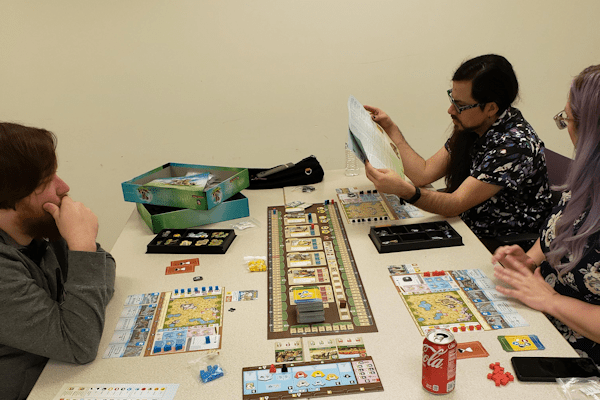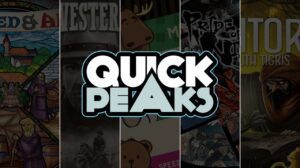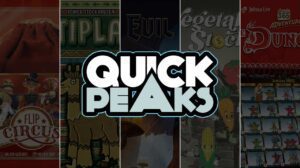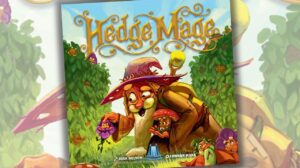
I recently had the pleasure of attending a local game convention, Congress of Gamers, with my daughter. I wrote about the event for Meeple Mountain. The two of us had a great time! One of the many wonderful parts of this trip was getting to speak with Eric Engelmann, the man who (along with his wife), operates this event. He and his wife were warm, inviting, and generous with their time as I asked questions about the operation. Eric went so far as to show me a few of the tools he has developed—which he shares for free with others who might want to do the same.

As I was putting the report together for Meeple Mountain, it became obvious that an interview with him would be as informative as it would be entertaining. Since this was my first venture into the convention, what you see below are images from the last few events, taken from the Congress of Gamers website. Without further ado, allow me to share with you Six Questions with Eric Engelmann.
Q1: My daughter and I attended Congress of Gamers this year. I had the pleasure of getting to spend some time with you and you showed me a tool that you created to help with the sales room—a tool that really seemed to keep the line moving—which you told me was offered up for free to anyone who would like to use it. Your website has links to advice you provide for those who would like to run small events like this one. What was the thought process that brought you to the point of giving this stuff away? Have you considered collecting it all into a volume that could be sold as a book?
Congress of Gamers is dedicated to supporting gamers. I’m blessed to be able to spend time and resources providing tools and enhanced gaming experiences for them. If there’s something I do that will help them, it’s generally something that doesn’t make sense for publishers and vendors. The Auction Store process is a prime example. Vendors have a hard time competing with the deals gamers make with other gamers. I’ve published and maintained an online document that details methods and resources for running a small, local convention. Another for techniques buyers can use to get great deals on games. Another for those who need to liquidate, or plan for liquidation of, large collections of board games. A calendar of upcoming board game conventions in DC, MD, VA. A Google map of game stores in these states. I started an encyclopedia of gaming accessories, but it’s too much work for one gamer. I wrote books on programming and early internet/intranet manuals, but haven’t published print documents in many years.
Q2: The collection of games available for use in the open gaming areas was quite impressive. I was able to experience several games that I had not gotten to play prior to this event. Your site includes advice on buying game collections—is this how you went about putting together the open gaming library? Do you have other methods that have allowed you to amass such a diverse collection? All of the games we played were complete and decently organized; how do you manage to keep them like this with a couple hundred random strangers digging through them each time you hold a convention?
The challenge for a small con (150-500 gamers) is curating. Too many games and there’s no place to play them, and transport/setup become prohibitive. I once focused on BGG’s highly rated games, but eventually realized that conventions need lighter, more popular titles that hard core players are willing to play and novices are able to learn. Heavy and complex games are generally brought by their fans, so a small con library needs to have shorter games that have proven themselves. This means that Stone Age is a better choice than Lisboa. Azul will see more play than War of the Ring. Can’t Stop meets the needs of more attendees than 1830. The heavy and newest title will generally be brought and promoted by their fans.
Board gamers are a remarkable group. Unlike the general population, gamers just don’t participate in the “shrinkage” culture and are very considerate of game contents. I walk the floors before closing to recover escaped bits, but found NONE after the last con. All that said, games get worn out, become unpopular, and need to be cycled out. A Library of 250 games should probably see 20 fresh titles each year. We “lose” perhaps two games per year; less than one game per convention.

Q3: I am going to guess and say around 200 people attended the Congress of Gamers event this year (please correct me if I am wrong). That is a decent number of people for a small, local, weekend event. I was especially impressed with the number of people you managed to draw for the second day. You mentioned that the sales room was one of the biggest draws for Saturday, and the rummage sale was part of your solution to bring in people on Sunday. How did the idea of the rummage sale come about? How has it evolved since you came up with it? What other aspects of your Sunday schedule were designed to keep people around for both days?
We had a bit more than 200 gamers that paid for badges. The Play-to-Win drawing is on Sunday. The Rummage and Bits sale is on Sunday. The tournament program (decathlon style) continues on Sunday, with awards Sunday afternoon. The Admission price for Sunday is half what Saturday costs.
Q3 follow-up: Your Sunday attendance was good. For example, I had no trouble at all finding people to play games with on either day, all day. I also noticed that it took far more time for the crowd in the room with the rummage sale to die down than I expected! I donated a few items to the sale; glad to know some people were able to get the things they needed to play the games they love. In those times where you are not running a convention, is there a way to contact you to donate such items?
Most people just bring and drop them. Those wishing to donate a collection of games (it occasionally happens) email me (info@emsps.com) to arrange pickup and transport. I have a small network of local and national dealers who buy collections and sell the games on BGG, FB Marketplace, eBay, etc.

Q4: I am fairly certain you are a gamer yourself. That said, the work you put in running the convention seemed to have made it impossible for you to simultaneously enjoy this hobby. When you are not prepping for, running, or cleaning up after an event, do you find much time to play games? If you do, what would you say are your top six games of all time, and why?
Viewed the right way, “conventioning” is now my favorite game. Creating an affordable and sustainable event that provides local and semi-local gamers with experiences a Friday night club can’t is a gaming puzzle that never gets old.
Q5: My daughter and I found that your event was well organized and ran very smoothly. This has not been the case for several other small, local events we have attended. What is the most important thing to do, in your opinion, if you want to have a successful event? Do you attend other conventions and board gaming events? What convention or event was the most pleasant to attend? What mistake(s) have you seen other conventions make that makes you cringe?
Work smart. Listen. Be patient. Make enough “profit” that you don’t eventually say “screw it” and stop doing it. My favorite conventions are those where playing is the focus. The four I attend to play games are the World Boardgaming Championships (WBC), PrezCon, EuroQuest, and the World Series of Board Gaming (I was a founding investor in WSBG, now just a player). My own pet peeve is lines. Gamers don’t go to conventions to wait in lines, but to have fun.
Q4/5 follow-up: I certainly understand what you mean when you say that “conventioning” is your favorite game these days. That said, you mention the fact that you attend several events each year just to play games. What games are you most looking to play? What games are the ones that, playing them, truly have become a part of the joys in your life?
I play Terraforming Mars on two “secret” servers every night (since the COVID lockdowns began) at 7pm with a mostly retired crew that knows the games VERY well. It’s like old men gathering to pass the time playing chess or checkers, only more interesting. The implementations are simply outstanding.
I play a wide range of Euros, such as Navigator, El Grande, Stone Age, Scythe, Agricola, St. Petersburg, Lords of Waterdeep, Five Tribes, and so on. Recent games I play at my Friday night in-person club are Dune Imperium and Ark Nova. I’ve found that I’m not as interested in learning the hottest new games any more. I have more fun playing any of the 100+ games I and the other players already know well.

Q6: Let us assume that there is this individual, let’s call her Barbara. She wants to organize a weekend event similar to Congress of Gamers. What are the first things she needs to do? How much money should Barbara have on hand? What are the best ways for her to advertise the event? What are the pitfalls that she, as someone new to this space, is likely to miss? Other than the resources you have on your site, what other sources of information should she be studying?
Barbara should network with gaming friends to run her first event. Some areas have libraries, community centers, and government or private programs to help fund space. Friends can bring games to share. Friends can run gaming events. Friends, local game stores, and local clubs can spread the word.

I hope that you have enjoyed reading this interview, and getting to know Mr. Engelmann as much as I enjoyed spending time with him—both at his event and (virtually) as I put this interview together. I am certain that Congress of Gamers will be a regular event for me in future years. If you find yourself in Maryland around the time of their Spring or Winter sessions, stop on by. You will not regret it!











Add Comment